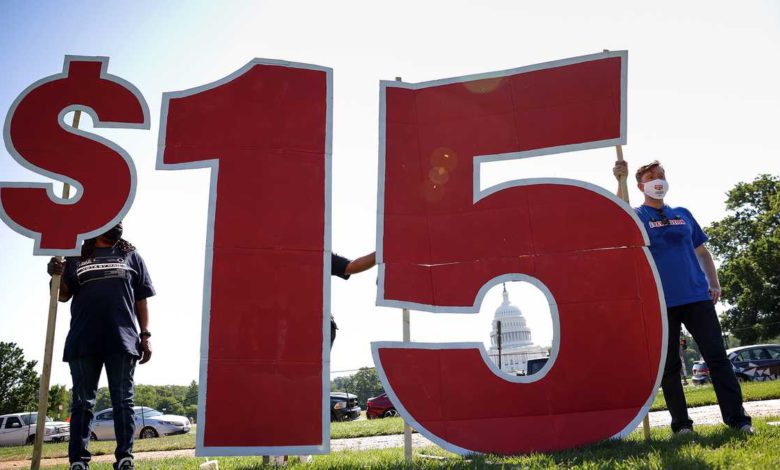

The year 2021 was marked by an innumerable number of rules tied to the coronavirus pandemic.As Americans navigated government and private sector mandates about masking and vaccinations, elected leaders also worked to change other aspects of everyday life, enacting laws that affect everything from public school curriculum to legal recreational pot.With 2022 upon us, here are some of the new laws that went into effect Jan. 1.Minimum wage increasesMany states have moved in recent years to increase their minimum wage requirements. Starting Saturday, 20 states saw a rise in their minimum wages take effect, while New York's increase began Friday.The Empire State's hike -- along with those in California, Delaware, Illinois, Maryland, Massachusetts, New Jersey and Rhode Island -- is part of scheduled raises to reach $15-per-hour minimums, according to a report from Wolters Kluwer Legal & Regulatory U.S., which provides finance, compliance and regulatory information.States also increased rates because of previously approved legislation or ballot initiatives, and other state-mandated wage increases -- in places like Arizona, Colorado, Maine, Minnesota, Montana, Ohio, South Dakota, Vermont and Washington -- are due to automatic cost-of-living adjustments that are based on inflation.Missouri voters passed a proposition in 2018 that gradually increases the statewide minimum wage to $12 over five years. Michigan, New Mexico and Virginia adopted similar legislation with $12 goals.Surprise medical billsThough the pandemic will bring some medical woes into 2022, Americans can bid farewell to at least one health care headache thanks to the No Surprises Act, which bans most surprise medical bills starting Saturday.The federal ban -- which Congress approved in late 2020 -- prohibits most unexpected medical charges from out-of-network providers and will apply to about 10 million bills a year, according to federal estimates.It protects patients when they receive emergency care or scheduled treatment from doctors and hospitals that are not in their insurance networks and that they did not choose. Consumers are responsible only for their in-network cost-sharing in these situations.School curriculumThe year 2021 saw fierce national and local debates over what students learn in schools, with a major point of contention being critical race theory. In Illinois, lawmakers moved to prioritize Asian American history by passing legislation requiring it in public schools.On Saturday, the state's Teaching Equitable Asian American History Act went into effect, making Illinois the first state to have such a requirement.The law requires schools to add a unit to the curriculum on "events of Asian American history," including the contributions of Asian Americans in advancing civil rights since the 19th Century, and "contributions made by individual Asian Americans in government and the arts, humanities, and sciences, as well as the contributions of Asian American communities to the economic, cultural, social, and political development of the United States," according to its text.Alcohol and recreational cannabisCalifornians of legal drinking age had something else to cheer to at midnight: several more years of to-go alcohol sales.The state had been allowing restaurants and some bars to sell alcoholic beverages to go since the early days of the pandemic, but a new law that went into effect Saturday extends the rule -- which was set to expire at the end of 2021 -- through Dec. 31, 2026."For many establishments, flexibilities like outdoor parklets and to-go cocktails have helped bring in critical revenue that allowed them to maintain operations during challenging times and keep workers on the payroll," Democratic Gov. Gavin Newsom said in a statement.And in Montana, residents 21 and older will be allowed to purchase cannabis for recreational use in some counties starting Saturday.A new law permits the possession and purchase of "up to one ounce of cannabis, which may include up to eight grams of concentrate and/or up to 800 mg of THC in edible form," according to the Marijuana Policy Project. Adults can also "cultivate up to two cannabis plants in their home, with no more than four plants per household," the group said.The law applies only to counties that approved a 2020 ballot initiative related to recreational cannabis use.EnvironmentAs policymakers have discussed humans' impact on the environment, some mundane things were caught in the crosshairs.For residents of Washington, DC, it's gas-powered leaf blowers.A regulation passed in 2018 outlaws the use of the tools by residents and landscapers, and carries fines of up to $500.The delay in the rule's implementation "allowed the city and others affected time to switch to more eco-friendly electric leaf blowers or some other alternative," according to The Washington Post, which said the gas-powered blowers "can be as loud as heavy traffic and cause health problems for people who breathe their fumes."
The year 2021 was marked by an innumerable number of rules tied to the coronavirus pandemic.
As Americans navigated government and private sector mandates about masking and vaccinations, elected leaders also worked to change other aspects of everyday life, enacting laws that affect everything from public school curriculum to legal recreational pot.
With 2022 upon us, here are some of the new laws that went into effect Jan. 1.
Minimum wage increases
Many states have moved in recent years to increase their minimum wage requirements. Starting Saturday, 20 states saw a rise in their minimum wages take effect, while New York's increase began Friday.
The Empire State's hike -- along with those in California, Delaware, Illinois, Maryland, Massachusetts, New Jersey and Rhode Island -- is part of scheduled raises to reach $15-per-hour minimums, according to a report from Wolters Kluwer Legal & Regulatory U.S., which provides finance, compliance and regulatory information.
States also increased rates because of previously approved legislation or ballot initiatives, and other state-mandated wage increases -- in places like Arizona, Colorado, Maine, Minnesota, Montana, Ohio, South Dakota, Vermont and Washington -- are due to automatic cost-of-living adjustments that are based on inflation.
Missouri voters passed a proposition in 2018 that gradually increases the statewide minimum wage to $12 over five years. Michigan, New Mexico and Virginia adopted similar legislation with $12 goals.
Surprise medical bills
Though the pandemic will bring some medical woes into 2022, Americans can bid farewell to at least one health care headache thanks to the No Surprises Act, which bans most surprise medical bills starting Saturday.
The federal ban -- which Congress approved in late 2020 -- prohibits most unexpected medical charges from out-of-network providers and will apply to about 10 million bills a year, according to federal estimates.
It protects patients when they receive emergency care or scheduled treatment from doctors and hospitals that are not in their insurance networks and that they did not choose. Consumers are responsible only for their in-network cost-sharing in these situations.
School curriculum
The year 2021 saw fierce national and local debates over what students learn in schools, with a major point of contention being critical race theory. In Illinois, lawmakers moved to prioritize Asian American history by passing legislation requiring it in public schools.
On Saturday, the state's Teaching Equitable Asian American History Act went into effect, making Illinois the first state to have such a requirement.
The law requires schools to add a unit to the curriculum on "events of Asian American history," including the contributions of Asian Americans in advancing civil rights since the 19th Century, and "contributions made by individual Asian Americans in government and the arts, humanities, and sciences, as well as the contributions of Asian American communities to the economic, cultural, social, and political development of the United States," according to its text.
Alcohol and recreational cannabis
Californians of legal drinking age had something else to cheer to at midnight: several more years of to-go alcohol sales.
The state had been allowing restaurants and some bars to sell alcoholic beverages to go since the early days of the pandemic, but a new law that went into effect Saturday extends the rule -- which was set to expire at the end of 2021 -- through Dec. 31, 2026.
"For many establishments, flexibilities like outdoor parklets and to-go cocktails have helped bring in critical revenue that allowed them to maintain operations during challenging times and keep workers on the payroll," Democratic Gov. Gavin Newsom said in a statement.
And in Montana, residents 21 and older will be allowed to purchase cannabis for recreational use in some counties starting Saturday.
A new law permits the possession and purchase of "up to one ounce of cannabis, which may include up to eight grams of concentrate and/or up to 800 mg of THC in edible form," according to the Marijuana Policy Project. Adults can also "cultivate up to two cannabis plants in their home, with no more than four plants per household," the group said.
The law applies only to counties that approved a 2020 ballot initiative related to recreational cannabis use.
Environment
As policymakers have discussed humans' impact on the environment, some mundane things were caught in the crosshairs.
For residents of Washington, DC, it's gas-powered leaf blowers.
A regulation passed in 2018 outlaws the use of the tools by residents and landscapers, and carries fines of up to $500.
The delay in the rule's implementation "allowed the city and others affected time to switch to more eco-friendly electric leaf blowers or some other alternative," according to The Washington Post, which said the gas-powered blowers "can be as loud as heavy traffic and cause health problems for people who breathe their fumes."
Source link







